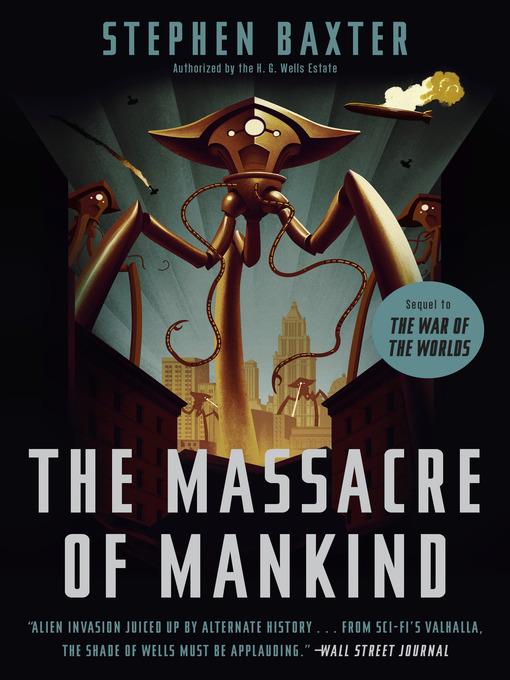
The Massacre of Mankind
Sequel to The War of the Worlds
کتاب های مرتبط
- اطلاعات
- نقد و بررسی
- دیدگاه کاربران
نقد و بررسی

July 3, 2017
This estate-authorized sequel to H.G. Wells’s The War of the Worlds is set in the early 1920s, but it has the feel of one of Baxter’s modern SF extravaganzas. It’s been 13 years since marauding Martians were vanquished by Earth bacteria, and the red planet is launching another invasion. The Martians have learned from their earlier experiences, but so have humans. Baxter presents this second conflict as one that pits the superior technology of the Martians against the guerilla ingenuity of scrappy Earthlings. The author takes a sweeping approach, providing a global panorama of the novel’s events, but most of the action is seen through the eyes of Londoner Julie Elphinstone, the former sister-in-law of the unnamed narrator of Wells’s novel (here named Walter Jenkins). Meticulous detail gives the story vividness and immediacy, but it draws the plot out unnecessarily, as do the repetitive scenes of devastation wrought by the Martian fighting machines. Once readers let go of any hope of a pastiche of Wells’s style, they’ll appreciate this capacious reworking of his themes. Agent: Christopher Schelling, Selectric Artists Literary & Talent.

June 15, 2017
After writing an award-winning sequel to H.G. Wells' The Time Machine (The Time Ships, 1995), Baxter revisits another Wells classic, War of the Worlds, with a sequel to the seminal 1898 tale of alien invasion.Set in 1920--13 years after the events of War of the Worlds--the story is narrated by journalist Julie Elphinstone, the sister-in-law of Walter Jenkins, the unreliable narrator who chronicled the First Martian War. Jenkins, who's in a hospital in Vienna undergoing therapy from renowned psychoanalyst Sigmund Freud, contacts Elphinstone in New York City with "grave news from the sky": the Martians have launched ships from the red planet and are returning to Earth, this time in far greater numbers. Elphinstone returns to England just in time to witness the Martians land en masse outside London and quickly overcome human resistance with their Heat-Rays and tripedal engines of war. It becomes apparent that the Martians are not just interested in conquest; they're attempting to colonize the planet. When another wave of Martian ships lands near population centers all over the world--in New York, Melbourne, Peking, etc.--Elphinstone and her cohorts are left with one last desperate attempt to defeat the invaders. But while Baxter (The Long Utopia, 2015, etc.) excels at describing the time period--as well as simultaneously creating a fascinating alternate history (Britain is a fascist state, Germany rules much of Europe, and the Titanic never sank)--the story has a decidedly detached feel to it. Part of the problem is in the delivery; Elphinstone is writing her memoir many years after the apocalyptic events so there is no feeling of immediacy, no real tension or question of outcome. The analytical, emotionally reserved narrative ultimately makes for a dull reading experience. A richly described and action-packed, albeit forgettable, glimpse into the near future of a science-fiction classic.
COPYRIGHT(2017) Kirkus Reviews, ALL RIGHTS RESERVED.

July 1, 2017
Baxter's sequel to Wells' classic narrative of a Martian invasion of Britain thwarted only by bacterial infection chronicles the return of the Martians in 1920, now armed with a better understanding of their own vulnerabilities as well as humanity's. The central protagonist, Julie Elphinstone, the former sister-in-law to Wells' nameless narrator, now known in Baxter's story as Walter Jenkins, not only witnesses the return of the Martians but journeys much like Walter into the heart of a Martian-occupied England. Baxter mixes his rendering of a Martian invasion widely increased in scope and severity with an account of an alternate world in which the First Martian War dramatically changed the history of the early twentieth century. Although Baxter's sketches of alternate history can at times feel a little incomplete and may not satisfy readers of that particular subgenre, The Massacre of Mankindwith its more grounded approach than other sequels to Wells' original, such as including scientific explanations for Martian technologyshould satisfy fans of both Baxter and Wells alike.(Reprinted with permission of Booklist, copyright 2017, American Library Association.)

March 15, 2017
Winner of the British Science Fiction Award and the Locus Award, Baxter offers a sequel to H.G. Wells's iconic The War of the Worlds, featuring Wells's narrator, Walter Jenkins. Fourteen years after the last invasion, humans complacently believe that they can defeat any threat from Mars. But Jenkins sees danger coming. With a 60,000-copy first printing.
Copyright 2017 Library Journal, LLC Used with permission.

























دیدگاه کاربران